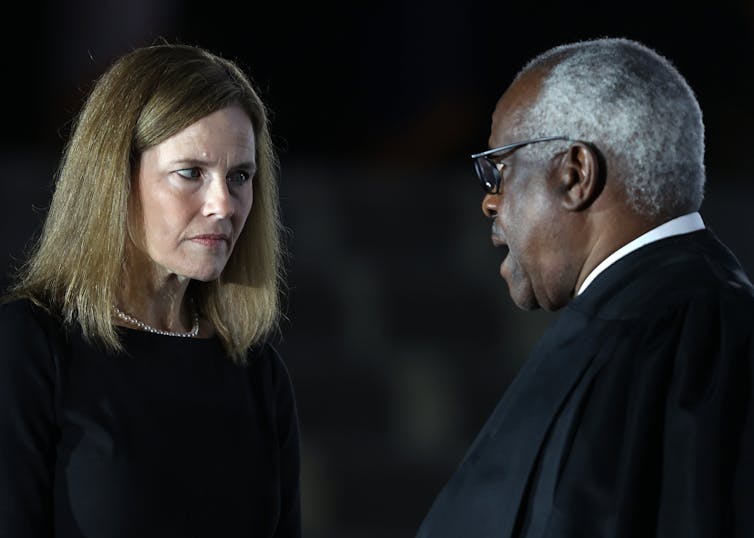Biden wins – experts on what it means for race relations, US foreign policy and the Supreme Court
By: Brian J Purnell, Bowdoin College; Morgan Marietta, University of Massachusetts Lowell, and Neta C. Crawford, Boston University

AP Photo/Andrew Harnik
The American public has had its say and for the first time in a generation denied a sitting president a second term.
President Donald Trump’s tenure lasted just four years, but in that time he dragged policy on an array of key issues in a dramatic new direction.
Joe Biden’s victory, confirmed by the Associated Press late morning on Nov. 7, presents an opportunity to reset the White House agenda and put it on a different course.
Three scholars discuss what a Biden presidency may have in store in three key areas: race, the Supreme Court and foreign policy.
Racism, policing and Black Lives Matter protests
Brian Purnell, Bowdoin College
The next four years under a Biden administration will likely see improvements in racial justice. But to many, it will be a low bar to clear: President Donald Trump downplayed racist violence, egged on right-wing extremists and described Black Lives Matter as a “symbol of hate” during his four-year tenure.
Indeed, according to polls, most Americans agree that race relations have deteriorated under Trump.
Still, Biden is in some ways an unlikely president to advance a progressive racial agenda. In the 1970s, he opposed busing plans and stymied school desegregation efforts in Delaware, his home state. And in the mid-1990s he championed a federal crime bill that made incarceration rates for Black people worse. He bungled the hearings that brought Clarence Thomas to the Supreme Court by allowing Republican senators to dismiss Anita Hill’s damning testimony of Thomas’ sexual harassment and by failing to allow other Black women to testify.
But that was then.
During the 2020 campaign, President-elect Biden consistently spoke about problems stemming from systemic racism. Many voters will be hoping that his actions over the next four years must match his campaign words.
One area that the Biden administration will surely address is policing and racial justice. The Justice Department can bring accountability to police reform by returning to practices the Obama administration put in place to monitor and reform police departments, such as the use of consent degrees. More difficult reforms require redressing how mass incarceration caused widespread voter disenfranchisement in Black American and Latino communities.
“My administration will incentivize states to automatically restore voting rights for individuals convicted of felonies once they have served their sentences,” Biden told The Washington Post.
The killing of George Floyd earlier this year reinvigorated talk of addressing systemic racial discrimination through fundamental changes in how police departments hold officers accountable for misconduct and excessive force. It is unclear how far President-elect Biden will walk down this road. But evoking the words of the late civil rights icon and Congressman John Lewis, he at least suggested at the Democratic National Convention that America was ready to do the hard work of “rooting out systemic racism.”

Jeenah Moon/Getty Images
Biden can help address how Americans think about and deal with unexamined racial biases through reversing the previous administration’s executive order banning anti-racism training and workshops. In so doing, Biden can build on psychological research on bias to make American workplaces, schools and government agencies equitable, just places.
Making progress fighting systemic racism will be a slow, uphill battle. A more immediate benefit to communities of color could come through Biden’s COVID-19 pandemic response – the Trump administration’s failure to stanch the spread of the coronavirus has led to deaths and economic consequences that have disproportionately fallen on racial and ethnic minorities.
On matters of race relations in the U.S., most Americans would agree that the era of Trump saw the picture worsen. The good news for Biden as president is there is nowhere to go but up.
The Supreme Court
Morgan Marietta, University of Massachusetts Lowell
Despite the fact that American voters have given Democrats control of the presidency, the conservative Supreme Court will continue to rule on the nature and extent of constitutional rights.
These liberties are considered by the court to be “beyond the reach of majorities,” meaning they are intended to be immune from the changing beliefs of the electorate.
However, appointees of Democrats and Republicans tend to have very different views on which rights the Constitution protects and which are left to majority rule.
The dominant judicial philosophy of the conservative majority – originalism – sees rights as powerful but limited. The protection of rights recognized explicitly by the Constitution, such as the freedoms of religion, speech and press and the freedom to bear arms, will likely grow stronger over the next four years. But the protection of expansive rights that the court has found in the phrase “due process of law” in the 14th Amendment, including privacy or reproductive rights, may well contract.
The Biden administration will probably not agree with the court’s future rulings on voting rights, gay rights, religious rights or the rights of noncitizens. Ditto for any rulings on abortion, guns, the death penalty and immigration. But there is little President-elect Biden can do to control the independent judiciary.
Unhappy with what a strong conservative majority on the court may do – including possibly overturning the Affordable Care Act – many Democrats have advocated radical approaches to altering what the court looks like and how it operates, though Biden himself has not stated a clear position.

Tasos Katopodis/Getty Images
Suggested options include term limits, adding a retirement age, stripping the jurisdiction of the court for specific federal legislation, or increasing the size of the court. This strategy is known historically as court packing.
Ruth Bader Ginsburg opposed expanding the court, telling NPR in 2019 that “if anything would make the court look partisan, it would be … one side saying, ‘When we’re in power, we’re going to enlarge the number of judges, so we would have more people who would vote the way we want them to.’”
The Constitution does not establish the number of justices on the court, instead leaving that to Congress. The number has been set at nine since the 1800s, but Congress could pass a law expanding the number of justices to 11 or 13, creating two or four new seats.
However, this requires agreement by both houses of Congress.
The GOP seems likely to maintain a narrow control of the Senate. A 50/50 split is possible, but that won’t be clear until January when Georgia holds two runoff elections. Any of the proposed reforms of the court will be difficult, if not impossible, to pass under a divided Congress.
This leaves the Biden administration hoping for retirements that would gradually shift the ideological balance of the court.
One of the most likely may be Justice Clarence Thomas, who is 72 and the longest-serving member of the current court. Samuel Alito is 70 and Chief Justice John Roberts is 65. In other professions, that may sound like people soon to retire, but at the Supreme Court that is less likely. With the other three conservative justices in their 40s or 50s, the Biden administration may be fully at odds with the court for some time to come.
Foreign policy and defense
Neta Crawford, Boston University
President-elect Biden has signaled he will do three things to reset the U.S.‘s foreign policy.
First, Biden will change the tone of U.S. foreign relations. The Democratic Party platform called its section on military foreign policy “renewing American leadership” and emphasized diplomacy as a “tool of first resort.”
Biden seems to sincerely believe in diplomacy and is intent on repairing relations with U.S. allies that have been damaged over the last four years. Conversely, while Trump was, some say, too friendly with Russian President Vladimir Putin, calling him a “terrific person,” Biden will likely take a harder line with Russia, at least rhetorically.
This change in tone will also likely include rejoining some of the treaties and international agreements that the United States abandoned under the Trump administration. The most important of these include the Paris Climate Agreement, which the U.S. officially withdrew from on Nov. 4, and restoring funding to the United Nation’s Intergovernmental Panel on Climate Change.
If the U.S. is to extend the New START nuclear weapons treaty, the arms control deal with Russia due to expire in February, the incoming Biden administration would likely have to work with the outgoing administration on an extension. Biden has also signaled a willingness to rejoin the Iran nuclear deal jettisoned by Trump, if and when the Iranians return to the limits on nuclear infrastructure imposed by the agreement.
Second, in contrast to the large increases in military spending under Trump, President-elect Biden may make modest cuts in the U.S. military budget. Although he has said that cuts are not “inevitable” under his presidency, Biden has hinted at a smaller military presence overseas and is likely to change some priorities at the Pentagon by, for instance, emphasizing high-tech weapons. If the Senate – which must ratify any treaties – flips to Democrats’ control, the Biden administration may take more ambitious steps in nuclear arms control by pursuing deeper cuts with Russia and ratifying the Comprehensive Test Ban Treaty.

Wakil Kohsar/AFP via Getty Images
Third, the Biden administration will likely continue some Bush, Obama and Trump foreign policy priorities. Specifically, while a Biden administration will seek to end the war in Afghanistan, the administration will keep a focus on defeating the Islamic State and al-Qaida. Biden has said that he would reduce the current 5,200 U.S. forces in Afghanistan to 1,500-2,000 troops operating in the region in a counterterrorism role. The Biden administration is likely to continue the massive nuclear weapons modernization and air and naval equipment modernization programs begun under the Obama administration and accelerated and expanded under Trump, if only because they are popular with members of Congress who see the jobs they provide in their states.
[Deep knowledge, daily. Sign up for The Conversation’s newsletter.]
And like the Bush, Obama and Trump administrations, the Biden administration will prioritize the economic and military threats it believes are posed by China. But, consistent with its emphasis on diplomacy, the Biden administration will likely also work more to constrain China through diplomatic engagement and by working with U.S. allies in the region.![]()
Brian J Purnell, Associate Professor of Africana Studies and History, Bowdoin College; Morgan Marietta, Associate Professor of Political Science, University of Massachusetts Lowell, and Neta C. Crawford, Professor of Political Science and Department Chair, Boston University
This article is republished from The Conversation under a Creative Commons license. Read the original article.
Written by: Natasha
Similar posts
MORE ARTICLES

ANC Youth League demands justice for Sindiso Magaqa beyond hitman’s conviction

Liverpool FC vows to pay out Diogo Jota’s R350 million contract to his widow

The World Show with Nicky B broadcasts live from France

Sindiso Magaqa assassin handed an 85-year sentence

Skhumba, Kgomotso and Glen weigh in on reincarnation
QUICK LINKS
UpComing Shows

The Best T in the City
With T Bose
He has held it down in the world of mid-morning radio with the best music, riveting topics, brilliant mixes and interesting guests. Every weekday, The Best T proves why he is the BEST by connecting to you like only your bro or favourite uncle could. He lets his listeners dictate the songs they want to hear in the ever-popular Top 10 at 10, and his Three Teaspoons never run out. Catch The Best T in the City Mondays to Fridays from 09h00 to 12h00.
close
Feel Good
With Andy Maqondwana
Feel good about feeling good! That's exactly what The Feel-Good show is about. An escape from the negativity that surrounds us, indulging you in good feels. Pass it on to one and all. Spread the good feeling around Gauteng with Andy Maqondwana.
close
Kaya Biz
With Gugulethu Mfuphi
The world of business is simplified for you by Kaya Biz with Gugulethu Mfuphi. This fast-paced award-winning business show talks to the corporate giants as well as up and coming entrepreneurs about their wins and challenges. Gugulethu invites guests to offer their analyses of markets and economies, and also delves into issues of personal financial wellness. Kaya Biz airs Mondays to Thursdays 18h00 to 19h00.
close
Point of View
With Phemelo Motene
Point of View with Phemelo Motene delves into the day’s current affairs, touches on real issues that affect people’s daily lives and shares expert advice on questions posed by the audience. Mondays to Thursdays 20:00 to 22:00.
closeConnect with Kaya 959
DownLoad Our Mobile App
© 2025 Kaya 959 | On The Street On The Air











